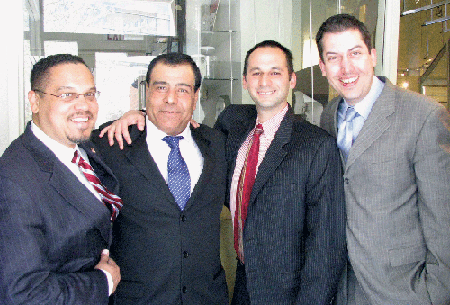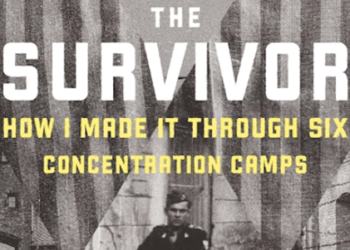In Israel’s hospitals political differences are left at the front door. The job of healing makes no distinction as far as race, religion and ethnicity. Hospitals in Israel are models of peaceful coexistence. Dr. Izzeldin Abuelaish, who was raised in Gaza’s teeming Jubaliya refugee camp, realized his dream of becoming a doctor and entered this sphere as an ob-gyn. He practiced in Israeli hospitals for 15 years.
On Jan. 16, 2009, the life Dr. Abuelaish had built exploded before his eyes when an Israeli artillery shell hit his home and killed three of his daughters and a niece. Another daughter and a niece were seriously wounded. The carnage was part of the Israeli military operation in Gaza called Cast Lead; and thousands of Israelis heard the doctor’s anguished cell phone call, which was broadcast live on a TV news program.
Abuelaish was a featured panelist in a town hall meeting in South Minneapolis last week sponsored by Rep. Keith Ellison. They were joined by Hadar Susskind, director of policy and strategy at J Street, the “pro-Israel, pro-peace” Washington-based lobbying group; and Greg Khalil, a lawyer of Palestinian Christian ancestry and the co-founder of the Kairos Project, which promotes education toward achieving a diplomatic resolution of the Israeli-Palestinian conflict. The discussion on April 8 was titled “Hopeful Personal Narratives: The Struggle for Israeli-Palestinian Peace.”
As difficult as it is to make progress on a peace deal in the Middle East, promoting conciliation in the Upper Midwest also seems to be a daunting prospect. After the panelists told their personal stories, local attendees were allowed to make comments and ask questions, within a one-minute time limit. The comments were overwhelmingly hostile to Israel and often quite vituperative, in marked contrast to the orientation of the panelists’ views. Basically, it was a forum for Israel haters, who seized the moment to vent, without any apparent regard to what could be accomplished beyond the personal satisfaction garnered from their self-expression.
Rep. Ellison had cautioned at the outset that views would be expressed that some would find offensive; but he asked for a consensus among those present to help maintain an atmosphere of civil discourse. In the course of the bitter denunciations of Israel, someone in the room passed a note to Ellison, expressing trepidation about voicing a view in support of Israel. Among those dissenting from the leftist anti-Israel orthodoxy that night was Rabbi Amy Eilberg, who suggested that the “language of outrage… is not the language of reconciliation.”

Khalil, who has relatives in the West Bank and has worked with Palestinian peace negotiators, responded to the verbal barrage. “We do have to find a new discourse that is genuinely hopeful,” he said, and added pointedly that “there’s a lot of blame to go around,” when it comes to assessing the generally dismal state of Middle East affairs.
I had the opportunity to talk with Ellison, Abuelaish, Suskind and Khalil earlier in the day, and was heartened to find that these individuals from varied backgrounds are working to find some common ground — and to prompt the United States government, the indispensable player in resolving the conflict, to increase the peace.
I asked Dr. Abuelaish if he ever received an apology or a satisfactory explanation about the killing of his beloved daughters. “I can say to you, my daughters were killed for no reason, without any justification,” he replied. “But even if there is a reason or no reason… they are gone now and I have to look forward and to move ahead.” Gazans are “expecting the worst,” he said, and asked rhetorically, “How many tragedies do we need to experience until we learn… that prevention is better than treatment.
“It is not the apology or the justification; it happened, and the three lives are gone.”
Then the Palestinian doctor from Gaza reminded me that “all religions recommend to save lives… and saving one life, you save the world — this is Judaism.”
Beyond the personal narratives, there were discussions of policy in my interview, and at the town hall forum on the evening of April 8.
Ellison returned last week from his second visit to Gaza, and pronounced the humanitarian situation “very grim. In many ways, it’s as bad as it was right after Operation Cast Lead,” which ended two days before President Obama’s inauguration. Ellison said that the “tunnel economy,” a literally underground system of bringing supplies into Gaza, which is blockaded by both Israel and Egypt, has become more sophisticated. “There’s a tobacco tunnel, there’s an electronic goods tunnel, there’s a livestock tunnel,” he recalled. It’s all there on view for a U.S. congressman. Of course, there is a tunnel for weapons, too, which Ellison did not see.
At the Thursday evening meeting at the Zuhrah Shrine Center on Park Avenue, Ellison said that he has been branded by some critics as one of the “Hamas 54,” a reference to the 54 U.S. House members who signed a letter to President Obama calling for a lifting of the blockade of Gaza. An element of the argument the House members advance — also endorsed by some Israeli officials — is that lifting the blockade would provide more security for Israel, because the flow of goods into Gaza could be secured at monitored crossing points, which is not the case with the tunnels near Rafah. It also should be mentioned that J Street, along with other American groups focused on promoting a negotiated Mideast peace deal, endorsed the House members’ letter to Obama.
Ellison — who made another visit to Sderot, the Israeli town that has been under the barrage of rockets from Gaza — also told me that he was distressed to find that young Palestinians in Gaza have formed negative attitudes about Israelis in the absence of any firsthand experience of their neighbors. Hadar Susskind suggested that Israelis likely have the same prejudices about the Gazans whom they have never really known.
And I was struck by Dr. Abuelaish’s response to a comment at the evening forum that characterized the Gaza rockets targeting Israeli civilians as “crude” and not capable of doing much damage. The doctor, who condemned human rights violations by both Palestinians and Israelis, said that there were very serious consequences from these “crude rockets”; they provoked Israel to launch a military assault that took the lives of his three daughters. Hundreds of civilians in Gaza died during Cast Lead.
The parameters of an Israeli-Palestinian peace deal have been roughly defined for the past 17 years now. The process of negotiating an equitable compromise has been complicated by myriad factors, but innovative approaches could conceivably break the stalemate. Or we could just continue screaming at one another.
— Mordecai Specktor / editor [at] ajwnews [dot] com
(American Jewish World, 4.16.10)





















well said.